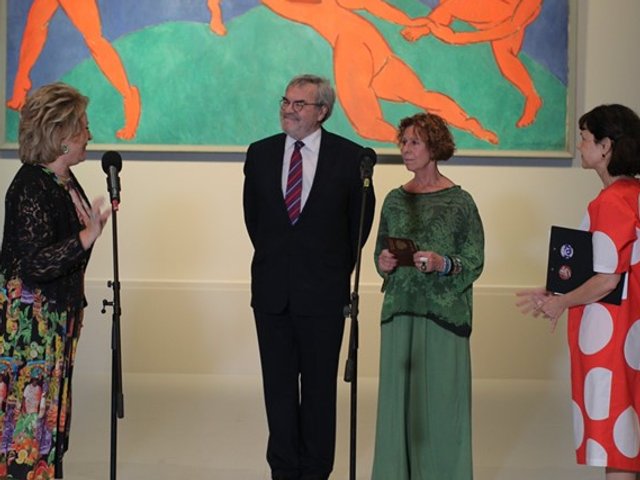Moscow
Accusations worthy of the tabloid press are flying in a court battle over a private collection of 192 icons that experts say is one of Russia’s most significant and unusual troves of religious art, worth at least $30m. The collection belonged to Mikhail de Boire, a Russian businessman, who died intestate in 2009 after suffering from pancreatic cancer. One of De Boire’s ex-wives (he is believed to have been married at least five times), Lyubov Yelizavetina, is pitted against his last wife, Tatyana de Boire, and his children from previous relationships in contesting the ownership of the icons.
Seventy-five of the icons are being held in storage at the State Pushkin Museum of Fine Arts, following a Moscow city court ruling in June. Yelizavetina, who says she spent years helping De Boire gather the collection, donated the 75 icons, which she claims are the best of the group, to the Pushkin Museum in 2010. The donation was made after she brought the icons to wider attention with a major exhibition at Moscow’s Tsaritsyno Palace complex. De Boire’s widow sued after the exhibition, saying the icons were lawfully hers, and had been stolen by Yelizavetina.
“We’re not exhibiting [the 75 icons] because they are under seal,” says Anna Dvornikova, the museum’s chief legal counsel. “We had planned to exhibit them because they are a significant donation.”
The hearings have been remarkably frank, including detailed questioning and testimony on when the relationship ended between Yelizavetina and De Boire, who became a couple in the 1990s and married in 2002. They divorced in 2008. Yelizavetina was accused of travelling to the US to shop rather than assist her ailing husband when he sought medical treatment there. Yelizavetina has countered, saying De Boire’s widow, Tatyana, married the collector when he was heavily medicated and in and out of consciousness just weeks before his death and therefore unaware of what was happening. “It’s horrible when you have cancer and have money,” says Yelizavetina. “You are kept alive until the last minute.” Tatyana de Boire’s lawyer, Ruslan Koblev, claims that Yelizavetina was pregnant with another man’s child when still married to De Boire, but Yelizavetina responds that the split was amicable and De Boire was the first to congratulate her on the birth of her child.
The collection, which De Boire began in 1977, during the Soviet era, includes rare icons from the Russian north. Tatyana Potapova, the Pushkin’s chief curator, says the icons are “museum-level quality”.
“They are primitive, but very interesting. The 14th-century icons of the Descent into Hell, the 16th-century Icon of the Annunciation, they are the most interesting things,” says Natalia Komashko of the Andrei Rublev Museum of Early Russian Culture and Art, who was one of the authors of a catalogue of De Boire’s collection.”
Earlier this year, Moscow’s Presnensky district court ruled in favour of Tatyana, who had been De Boire’s carer when he was terminally ill. Yelizavetina is contesting the court ruling.
Viktor Petrakov, a senior official in the Russian ministry of culture, has been dragged into the dispute, with Koblev claiming he has assisted Yelizavetina to “hide” the rest of the icons. At the end of August, court marshals came to Rosizo, a state-run art repository which also stores private collections, and impounded items belonging to Yelizavetina.
Originally appeared in The Art Newspaper as 'Major collectors and new museums'


